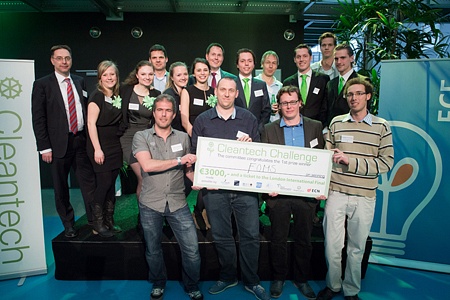In January, students from universities across the Netherlands will compete to save the environment.
The CleanTech Challenge 2015 calls on students with any idea that can potentially contribute to a greener environment to participate.
Co-hosted by YES Delft, the TU Delft Energy Club, the Erasmus University of Rotterdam Financial Study Association and the Erasmus Centre for Entrepreneurship Students, the challenge aims to encourage people to come up with great green ideas.
The CleanTech Challenge Netherlands is part of a global Clean Technology Challenge hosted by the London Business School and the University College London. Started in 2009, the aim of the competition is to identify ‘innovative clean technology ideas that have been from a concept phase to a stage in which they would ideally attract Series A funding or otherwise be self-sustainable’ according to their website.
Recently, the Netherlands challenge was linked to a Sustainable Business Game course hosted by the Delft Centre for Entrepreneurship and the TU Delft Valorisation Centre. Those who apply for the course (from any Dutch university) get 5 ECTS. “The competition is open to people across disciplines. We are looking new and innovative ideas,” said Jeroen Koot, marketing, CleanTech Challenge.
The challenge kicked off with a networking event on December 10, 2014. Since people have to participate in teams of up to five people, the event was geared towards those looking for likeminded or people with varied areas of expertise to get together and form teams. The deadline for the submission of ideas is January 10, 2015. Following which there are four more rounds. “If there is someone who has an idea but not a team, they can write to us and we can try and link them with suitable partners,” added Koot. From the January 15, 2015 teams will start getting coaching from experts, following which business workshops will be held. The winners will proceed to London for a CleanTech boot camp. The winners of the Dutch challenge get 3,000 euros and the international winners get 10,000 euros.
In 2012, Netherlands’ winning team Sunuru also won the global challenge for their idea on how to reduce the cost of solar tech. Unfortunately, the start-up founded by the winners is now closed.
Interestingly, the 2015 challenge places a lot of emphasis on the business aspect of things. “We found that teams with a business student were at a distinct advantage when it came how they presented their product and how they perceived the real world application of it,” said Koot. A number of workshops and training sessions will be conducted by business students and professors as well.
The last date to apply for the CleanTech Challenge is January 10, 2015.



Comments are closed.